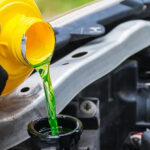A petrol engine (also known as a gasoline engine) is an internal combustion engine that operates using the Otto cycle. Unlike diesel engines, petrol engines rely on spark plugs to ignite the air-fuel mixture within the cylinders.
No products were found matching your selection.
Key Characteristics of Petrol Engines:
- Spark Ignition: Petrol engines use spark plugs to ignite the air-fuel mixture. The spark timing is controlled to ensure efficient combustion.
- Smooth Operation: Petrol engines typically run smoother and quieter than diesel engines. They are designed to operate at higher RPMs, providing a more refined driving experience.
- Power Output: These engines often provide higher power output per unit of displacement compared to diesel engines, making them suitable for performance-oriented vehicles.
- Fuel Type: They use petrol (gasoline), which is more volatile than diesel. Petrol engines tend to start more easily in cold conditions.
- Emissions: Modern petrol engines are equipped with technologies like catalytic converters to reduce harmful emissions. However, they generally produce more carbon dioxide (CO2) than diesel engines.
- Maintenance: Petrol engines often require more frequent maintenance compared to diesel engines, but they tend to be lighter and more compact.
Applications:
Petrol engines are widely used in:
- Automotive: Most passenger cars and motorcycles.
- Power Tools: Lawn mowers, chainsaws, and other small equipment.
- Marine: Smaller boats and personal watercraft.
Advantages:
- Performance: Petrol engines offer quick acceleration and higher RPMs, making them ideal for sporty driving.
- Less Noise and Vibration: They generally produce less noise and vibration compared to diesel engines.
- Cold Start: Easier to start in cold weather due to the volatility of petrol.
Overall, petrol engines are known for their performance and smooth operation, making them a popular choice for passenger vehicles and small machinery.






